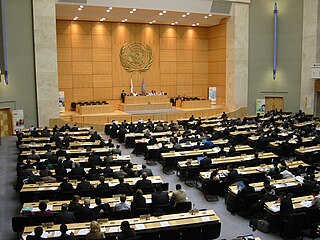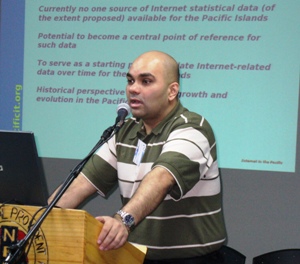Related Research Articles

The World Summit on the Information Society (WSIS) was a two-phase United Nations-sponsored summit on information, communication and, in broad terms, the information society that took place in 2003 in Geneva and in 2005 in Tunis. One of its chief aims was to bridge the global digital divide separating rich countries from poor countries by increasing internet accessibility in the developing world. The conferences established 17 May as World Information Society Day.
The Association for Progressive Communications (APC) is an international network of organizations that was founded in 1990 to provide communication infrastructure, including Internet-based applications, to groups and individuals who work for peace, human rights, protection of the environment, and sustainability. Pioneering the use of ICTs for civil society, especially in developing countries, APC were often the first providers of Internet in their member countries.

The United Nations Information and Communication Technologies Task Force was a multi-stakeholder initiative associated with the United Nations which is "intended to lend a truly global dimension to the multitude of efforts to bridge the global digital divide, foster digital opportunity and thus firmly put ICT at the service of development for all".
Privacy International (PI) is a UK-based registered charity that defends and promotes the right to privacy across the world. First formed in 1990, registered as a non-profit company in 2002 and as a charity in 2012, PI is based in London. Its current executive director, since 2012, is Dr Gus Hosein.

The Centre for Democracy and Development (CDD) was established in the United Kingdom in 1997 and subsequently registered in Lagos, Nigeria, in 1999. The organisation aims to promote the values of democracy, peace and human rights in Africa, particularly in the West African sub-region.

Digital rights are those human rights and legal rights that allow individuals to access, use, create, and publish digital media or to access and use computers, other electronic devices, and telecommunications networks. The concept is particularly related to the protection and realization of existing rights, such as the right to privacy and freedom of expression, in the context of digital technologies, especially the Internet. The laws of several countries recognize a right to Internet access.

The Internet Governance Forum (IGF) is a multistakeholder governance group for policy dialogue on issues of Internet governance. It brings together all stakeholders in the Internet governance debate, whether they represent governments, the private sector or civil society, including the technical and academic community, on an equal basis and through an open and inclusive process. The establishment of the IGF was formally announced by the United Nations Secretary-General in July 2006. It was first convened in October–November 2006 and has held an annual meeting since then.
ZaMirNET (ForPeaceNET) is a Croatia-based non-governmental organisation working in the field of ICT. It describes itself as "a citizen association dedicated toward civil society development, promoting the culture of peace and the idea of sustainable development in Croatia and the region."
BytesForAll is a South Asian initiative to focus on how information technology and the internet can help in taking up social development issues. It is one of the oldest ICT4D networks in South Asia. It was launched at a time when ICT4D was yet to become a buzz-word on the development circuit, and was still largely unnoticed for its potential.

BlueLink Information Network is a virtual network of Bulgarian non-governmental organizations (NGOs) based in Sofia, Bulgaria, which offers a variety of Internet-based services for NGOs and others interested in issues related to the environment, natural resources and sustainable development. It focuses on three areas: access to information, co-operation between NGOs and other sectors, and access to the new technologies of information in order to support sustainable development, democracy and civil society. It is available in Bulgarian and English.

Rajnesh Dhirendra Singh is a Fijian entrepreneur and engineer. He holds several positions in the regional and international Information and Communications Technology community including the Internet Society and IPv6 Forum, and is an active Internet advocate and speaker on Internet technologies.

Ungana-Afrika, Swahili for "connect africa", is a non-governmental organisation based in Pretoria, South Africa that provides a wide range of ICT services for civil society within and outside of Africa. It aims to better empower civil society organisations, networks and related stakeholders, in terms of ICT capacity and resources, so they may more efficiently achieve their unique social missions.
The Information Management Resource Kit (IMARK) is a partnership-based e-learning initiative developed by the Food and Agriculture Organization (FAO) of the United Nations and partner organizations to support individuals, institutions and networks worldwide in the effective management of information and agricultural development. IMARK consists of a suite of distance learning resources and tools on information management.
Take Back The Tech is a global campaign that connects the issue of violence against women and information and communications technology (ICT). It aims to raise awareness on the way violence against women is occurring on ICT platforms such as the Internet and mobile phones, and to call for people to use ICT in activism to end violence against women.

Anriette Esterhuysen is a human rights defender and computer networking pioneer from South Africa. She has pioneered the use of Internet and Communications Technologies (ICTs) to promote social justice in South Africa and throughout the world, focusing on affordable internet access. She has been the Executive Director of the Association for Progressive Communications since 2000 until April 2017, when she became APC's Director of Policy and Strategy. In November 2019 United Nations Secretary-General António Guterres appointed Anriette Esterhuysen as the new Chair of the Internet Governance Forum’s Multistakeholder Advisory Group.

Jennifer Radloff is a South African feminist activist and a pioneer on Information and communications technology (ICT) for social justice. She works for the Association for Progressive Communications (APC) in the Women’s Rights Programme and is a board member of Women’s Net.
Valentina Hvale Pellizzer is a sexual rights human rights activist and feminist internet writer. She facilitated seminars, conferences and workshops on ICT, technology, digital storytelling, citizen journalism, digital security and privacy throughout the world. She is known for connecting women's rights, sexual rights, the internet politically and practically and as an advocate for a feminist internet in Bosnia and Herzegovina and wider. She is also known for having founded the alternative feminist portal zenskaposla.ba in Bosnia and Herzegovina.

Chat Garcia Ramilo is a feminist activist. She has over twenty years experience in different activities with Information and communications technology (ICT). Since April 2017, she leads the Association for Progressive Communications (APC). She is the Board Chair of the Center for Migrant Advocacy in the Philippines and a Board Member of the Association for Women's Rights in Development (AWID).
eQualitie is a Canadian digital security and DDoS mitigation Not-for-Profit organisation focused on the development and distribution of free, open-source software, services and security training to Civil society, NGO's, investigative journalists and independent media to protect and promote human rights and press freedom online. Founded in 2011, the group is based in Montreal, Quebec.
References
- 1 2 3 4 Foundation for Media Alternatives, "History of FMA". "". Archived from the original "" on January 13, 2007.
- ↑ Pan Asian Network on eGovernance, Openness, Access and Governance in Asian “Network Societies”: Developing an Open Governance Index. " "Archived copy". Archived from the original on 2011-08-24. Retrieved 2011-05-25.CS1 maint: archived copy as title (link)", Retrieved on May 26, 2011.
- ↑ Association for Progressive Communications, MDG3: Take Back the Tech! To End Violence Against Women Project, "", Retrieved on May 26, 2011.
- ↑ International Development Research Center, Privacy and the Information Society in Asia, "[ permanent dead link ]", Retrieved on May 26, 2011.